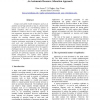Free Online Productivity Tools
i2Speak
i2Symbol
i2OCR
iTex2Img
iWeb2Print
iWeb2Shot
i2Type
iPdf2Split
iPdf2Merge
i2Bopomofo
i2Arabic
i2Style
i2Image
i2PDF
iLatex2Rtf
Sci2ools
102
click to vote
HICSS
2007
IEEE
2007
IEEE
Optimizing Regional Aid during Public Health Emergencies: An Autonomic Resource Allocation Approach
A large scale public health emergency such as an epidemic (occurring naturally or due to a bioterrorism attack) can result in an overwhelming number of human casualties. This can result in scarcity of healthcare resources such as beds, staffing, supplies and equipment. Regional aid in the form of central stockpiles and resource redistribution can help mitigate the resulting demand surge. However, optimizing resources across regional healthcare units requires continuous monitoring of resource usage in each unit, and coordinating the distribution of resources among them. Application of autonomic selfmanagement concepts can greatly relieve the cognitive challenges faced by decision makers in this context. This paper discusses an autonomic resource allocation approach for optimizing regional aid during public health emergencies. We explore three different regional aid programs and show that relative program effectiveness is dependent on resource and budget availability.
Biometrics | HICSS 2007 | Public Health | Regional Aid | Resource | System Sciences |
| Added | 02 Jun 2010 |
| Updated | 02 Jun 2010 |
| Type | Conference |
| Year | 2007 |
| Where | HICSS |
| Authors | Hina Arora, T. S. Raghu, Ajay S. Vinze |
Comments (0)

